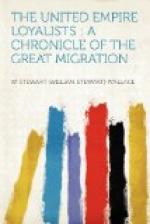New York was evacuated by the British troops on November 25, 1783. Sir Guy Carleton did not withdraw from the city until he was satisfied that every person who desired the protection of the British flag was embarked on the boats. During the latter half of the year Carleton was repeatedly requested by Congress to fix some precise limit to his occupation of New York. He replied briefly, but courteously, that he was doing the best he could, and that no man could do more. When Congress objected that the Loyalists were not included in the agreement with regard to evacuation, Carleton replied that he held opposite views; and that in any case it was a point of honour with him that no troops should embark until the last person who claimed his protection should be safely on board a British ship. As time went on, his replies to Congress grew shorter and more incisive. On being requested to name an outside date for the evacuation of the city, he declared that he could not even guess when the last ship would be loaded, but that he was resolved to remain until it was. He pointed out, moreover, that the more the uncontrolled violence of their citizens drove refugees to his protection, the longer would evacuation be delayed. ‘I should show,’ he said, ’an indifference to the feelings of humanity, as well as to the honour and interest of the nation whom I serve, to leave any of the Loyalists that are desirous to quit the country, a prey to the violence they conceive they have so much cause to apprehend.’
After the evacuation of New York, therefore, the number of refugee Loyalists who came to Nova Scotia was small and insignificant. In 1784 and 1785 there arrived a few persons who had tried to take up the thread of their former life in the colonies, but had given up the attempt. And in August 1784 the Sally transport from London cast anchor at Halifax with three hundred destitute refugees on board. ’As if there was not a sufficiency of such distress’d objects already in this country,’ wrote Edward Winslow from Halifax, ’the good people of England have collected a whole ship load of all kinds of vagrants from the streets of London, and sent them out to Nova Scotia. Great numbers died on the passage of various disorders—the miserable remnant are landed here and have now no covering but tents. Such as are able to crawl are begging for a proportion of provisions at my door.’
But the increase of population in Nova Scotia from immigration during the years immediately following 1783 was partly counterbalanced by the defections from the province. Many of the refugees quailed before the prospect of carving out a home in the wilderness. ’It is, I think, the roughest land I ever saw’; ‘I am totally discouraged’; ’I am sick of this Province’—such expressions as these abound in the journals and diaries of the settlers. There were complaints that deception had been practised. ’All our golden promises,’ wrote a Long Island Loyalist, ’are vanished




